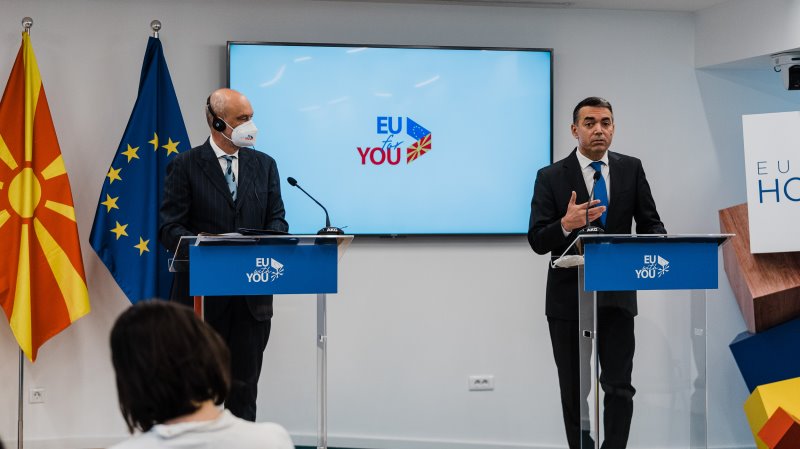“The Report shows that if it is about meeting the membership criteria, the negotiations should start at once.”
Deputy Prime Minister in charge of European Affairs, Nikola Dimitrov, today held a joint press conference with the Head of the EU Delegation to North Macedonia, Ambassador David Geer, where the European Commission Report on North Macedonia for 2021 and the Enlargement Package were presented.
Deputy Prime Minister Dimitrov stressed out that the EC Report on North Macedonia is a clear and unambiguous confirmation that even in times of serious challenges, with commitment and perseverance in relation to the country’s EU File, the high level of readiness for membership has been maintained and the requirements for opening the accession negotiations have been met steadily.
Dimitrov: “The key political message of this year’s European Commission Report is that we are continuing to meet the requirements for opening the accession negotiations, that the authorities are publicly demonstrating their firm commitment to the country’s progress on its path to the European Union. The country has maintained a steady and decisive pace in advancing its EU reforms and stepped up its efforts to achieve further visible or tangible results. I want to make it clear that this overall readiness is not about starting accession negotiations but about membership readiness – we have a high level of overall readiness and a solid pace of progress compared to last year.”
Dimitrov also referred to the Commission’s political messages that it is high time to start accession negotiations with North Macedonia because the stalemate has a very negative impact on the credibility of the Union in the region, and especially in North Macedonia as a leader therein.
Dimitrov: “The start of accession negotiations will confirm that the region is a geostrategic priority of the Union and it will confirm that the accession process is a process that implies meeting the membership criteria. According to the initial analysis of findings, North Macedonia has the highest readiness with an average score of 3.02 in the areas and chapters of Cluster 1 ‘Foundations’ even in comparison to the countries that are already negotiating their membership – Serbia with an average score of 2.68 and Montenegro with an average score of 2.83. Comparability of progress and overall readiness have been introduced precisely to ensure a reform competition in our region. The formal start of accession negotiations will be a huge political impetus for the implementation of more in-depth reforms at an accelerated pace, not only in terms of harmonization with the EU acquis, but also in terms of substantial implementation of the legislation adopted.” In continuation, Dimitrov presented the key findings and evaluations at cluster and area levels.
Asked by the media about the attempts to overcome the blockade from Bulgaria and address of these issues in the Enlargement Package, Dimitrov said:
“During the debate in another organization where we are a member – the Council of Europe, at the Parliamentary Assembly, I had the opportunity to respond to the accusations from Bulgaria mentioned yesterday regarding the violation of human rights, which I think are not productive. First, because they are very far from reality. It is not wise and it is not correct, and ultimately, member states should also be good neighbors, not just candidate states. I like the fact stated by the Report that agreements with both Greece and Bulgaria should continue to be respected and implemented by all parties involved. I think it is important that the European Commission found it necessary to emphasize this. We are in a process where both we, inside, and the EU policies towards the region, are a classic hostage of historical issues. And the new methodology specifies – one of my favorite paragraphs: unresolved bilateral issues should not hold the accession process hostage.”
Regarding Várhelyi’s comment that he cooperates with Kovachev, Dimitrov stressed that it is very important for us that at this stage the President of the Commission von der Leyen and the President of the Council Charles Michel are showing great interest and engagement, which points to the fact that by the inclusion of the EU highest level representatives Macedonian case is considered to be an extremely important issue, and the stakes are extremely high.
Dimitrov: “It gives us hope that by engaging at that level we will be able to make a breakthrough, although I think we should be very careful with our expectations, hope, etc. I would rather be surprised by the good news, because we have the experience of great disappointments.”
Ambassador Geer pointed out that the EC Report on North Macedonia confirms the readiness to start accession negotiations and stressed that it is very important that the country is maintaining a steady and decisive pace in its reforms, while to maintain the momentum, the support of the whole society will be required.

